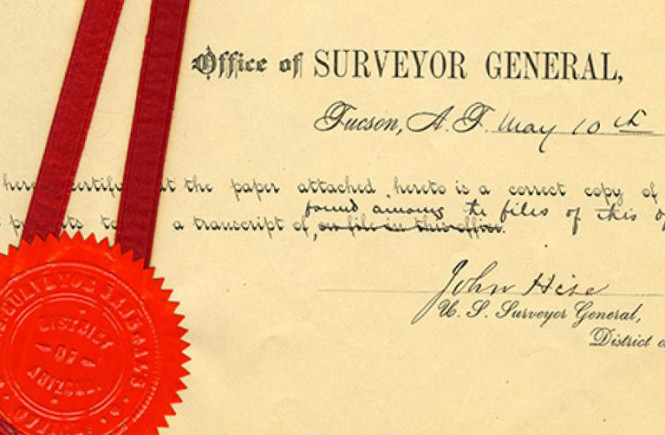The intersect of applying for grants, the writings of St. Augustine, and William Blake
William Blake said that we can see the world in a grain of sand. Probably he was speaking metaphorically. If not, considering that sand is very small and the Earth is very large (comparatively), you’d have to be standing pretty far from our planet in order to be able to do this. Just how far from the Earth would we have to stand to see it reflected within the surface of a crystal of sand? We can solve this equation:
2*arctan(diameter of earth/(2*distance grain of sand is from earth))= 2*arctan(diameter of grain of sand/(2*distance sand is from eye))
Assuming the grain of sand is a millimeter across and we’re holding it about 10 cm from our eyes, the answer is about 1,275,000 kilometers, or about three times the distance from the earth to the moon. So Blake probably meant this figuratively; the wonder of creation is found just as profoundly in the small as it is in the big…. or possibly he thought interplanetary space travel was possible in the year 1803. Reading some of his later prophetic poems will lead one to conclude that this latter intent is a distinct possibility.
In a clarification of NIH research grant application requirements we can see a reflection of a philosophical question: does progress exist?
Similar to Blake’s linking of the prosaic and the grand, in a clarification published this week of the National Institute of Health’s research grant application requirements, authored by the director of the NIH, Francis Collins, we can see a reflection of a long-standing philosophical question: does progress exist? For the impatient, just the title of the letter, “Basic science: Bedrock of progress”, makes an affirmative answer to that question. Not only does progress exist, the implicit sentiment is that it is for the good. The letter was penned to affirm the institute’s support for basic research, that is, research which doesn’t have a clear utilitarian objective but whose primary goal is to better understand a phenomenon. Applied research, in contrast, is directed to fixed and practical goals, such as an improved treatment for a specific disease. It’s clear how applied research intends to make our lives better. However a belief in the importance and usefulness of basic research makes a leap, and entails a faith that understanding our world in greater detail will naturally lead to an improved world.
But does it basic research really do this? Our recent history is filled with examples both pro and con: antibiotics and nuclear weapons, vaccines and global warming, clean drinking water and reality TV. Nonetheless, most of us (myself included) have some degree of faith in the power and benevolence (or at least innocuity) of progress. At worst we think it is just something that needs to be closely monitored, like a slightly self-destructive toddler. NIH’s statement is another voice in the choir singing its praises. However this faith in progress is not universal.
“For all funding requests at NASA one should state, if possible, that if the project was not funded that the astronauts would die.”
After I had finished a fellowship at Stanford I tried to become an exobiologist at NASA. Neither I nor NASA used the word “exobiologist”, instead the project I proposed used microarray technology (then very new) to examine simple microbial ecologies in extreme environments on Earth, but “exobiology” is what we were all thinking [though they were enthusiastic about the idea and offered me a position, administration details and funding were problems, and I reluctantly turned it down]. I learned two stratagems towards securing a position at NASA during my interviews. One was to ensure other researchers that I did not want to go into space; most researchers seemed to be hoping for one of the very few mission specialist position on a space shuttle or ISS mission. I assured them that Earth orbit had no relevance for me, and that the salt water ponds in NASA Ames’ backyard were much more relevant to my studies. Secondly, I was told that for all funding requests I should state, if possible, that if my project was not funded that the astronauts would die. This was not meant to be stated as a threat (though I suppose that might work too), but that the purpose of the research was directed towards a practical, in fact vital, goal, and was critical for advancing manned space flight.
Similarly, NIH grant applications must include a Public Health Relevance Statement so as to “ensure the description of the projects’ potential to improve public health is clearly articulated.” This has led many to express a fear, what with tightened budgets, that research with no immediate impact on public health may go unfunded. The necessity of framing one’s research goals in this constrained manner was, though not definitively worded so, possibly an affront to the idea of progress. Thus the public letter this week from Dr. Collins, and his assurances that NIH is dedicated to the promotion of basic research.
Certainly the use of the phrase, “Bedrock of Progress” in the title is a strong affirmation in the belief that progress exists. Bedrock is what we prefer to build our foundations upon, where possible. The skyline of Manhattan reflects the underlying geology of the island, the buildings rise highest where the bedrock is closer to the surface. However this sentiment about progress may be a relatively recent addition to human thought. The Greek philosophers didn’t seem to support this view; Plato suggested that while government might advance through stages, it was inherently unstable, and we weren’t inexorably progressing towards a better future. Instead the idea that cycles of rises and falls explains human history was a more accepted understanding. Greek mythology, in fact, suggests that we are descending from a previous golden age, the heroic epics of the time of Troy took place in a bronze age, and the Greeks at the time of Athens’ ascendancy were in an iron age. Instead of progress we are defined by retrogression: worse is yet to come.
The contrasting idea progress, of time as an arrow pulling humans along in its path towards a better future, may have arisen in the West with Christian philosophy. St. Augustine, writing around the year 400, believed that the events of the bible, specifically the birth, resurrection, and promised return of Jesus, are fixed points in time. With these unique milestones marking the path of our past, there cannot be a cyclical quality to our history. However the modern idea of progress, of human effort being the force that draws us forward, was an idea of the Enlightenment. That was the period around the mid 1700’s when a faith in God’s stewardship, and his overseers on Earth via the Church and the divine right of kings, was replaced by a confidence in our own ability to lead ourselves. Science was the brightest of our guiding lights on our march forwards.
“… no one has ever been so witty as you are in trying to turn us into brutes: to read your book makes one long to go about all fours.”
-Voltaire
Of course this movement did not lack its detractors. The Luddites of the early 19th century were not believers in the benevolence of progress. The phrase “noble savage” arose during the Enlightenment, extolling the virtues of those not sullied by the taints of civilization, stating that the rise of more complex societal structures and technology were not necessarily for our betterment. Jean Jacques Rousseau, who is often linked to that phrase though he never actually said it, argued that civilization should be reorganized on a simpler, fairer and more “natural” basis. Rousseau proudly sent a copy of his first book that expounded this view (Discours sur l’origin et les fondements de l’inégalité parmi les hommes) to Voltaire, chief wit of the Enlightenment and promoter of its ideals of progress. Voltaire replied, “… no one has ever been so witty as you are in trying to turn us into brutes: to read your book makes one long to go about all fours. Since, however, it is now some sixty years since I gave up the practice, I feel that it is unfortunately impossible for me to resume it.”, and he closed his letter with an invitation for Rousseau to come join him in Rousseau’s native Switzerland, “…you must come … here in your native place, enjoy its freedom, drink with me the milk of its cows, and browse on its grass. I am yours most philosophically and with sincere esteem.”
William Blake, who said we could see a world in a grain of sand, was decidedly in Rousseau’s camp. In his poem “London”, he writes disparagingly of its streets:
And mark in every face I meet
Marks of weakness, marks of woe.
In every cry of every Man,
In every Infants cry of fear,
In every voice: in every ban,
The mind-forg’d manacles I hear
This is not the bleakest of Blake’s poems about civilization’s effects.
Like Blake, we too can try to see our world, not in a grain of sand, but in the equally commonplace of the application criteria for an NIH grant. Believers in the power of science as a force that intrinsically pulls us forward to a better future balked at the limiting and utilitarian language of the mandated public health relevance statement, and NIH agreed. The instructions for the statement now clarify that one is to “describe how, in the short or long term, the research would contribute to fundamental knowledge about the nature and behavior of living systems and/or the application of that knowledge to enhance health, lengthen life, and reduce illness and disability.” And as stated earlier in this essay, their announcement of this clarification is titled “Basic Science: Bedrock of Progress”, in case we still weren’t sure of where they stood in this debate. NIH adds its voice to ours in the choir of progress.
Of course this letter from Dr. Collins does not end the dispute of Voltaire vs Rousseau in favor of Voltaire and progress. We arguably have more evidence now of the dangers of civilization and technology than at any time in our past. Despite this, however, most of us continue to believe that more knowledge and more technology will help. Is this illogical and a product of deluded thinking? Or is it rational and correct, or maybe a matter of faith and choice? Possibly a mixture of all three, and more probably, an idea that needs leadership and support.



